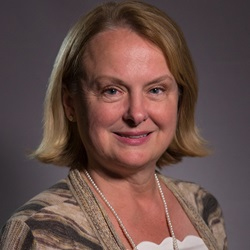Adaptability in the Face of Adversity
PRESIDENT’S MESSAGE
Springtime on campus signals the approaching close of another academic year, but this year, as with everything else these days, the end of the academic year looks a lot different than what we are used to. Typically, for our future food scientists, it’s a time to wrap up research projects, finish labs and papers, and take final exams. For those completing their undergrad or a graduate degree, their sights are set on commencement and the next stage in their journey. This year, however, faculty, staff, and students have had to adapt to postponed or canceled events, social distancing, and virtual everything, upending the typical spring-to-summer transition.
Starting in mid-March, many colleges and universities announced plans to extend spring break due to the COVID-19 pandemic. Not long after, as hopes of returning to campus dwindled, decisions were made to transition to virtual learning. Students are now living on empty campuses or are finishing the semester at home with their parents. IFTSA area meetings were sadly cancelled. Summer internships are in flux. Graduate students are left wondering about funding, timelines, managing virtual meetings, and thesis defenses. Research projects are placed on hold. Probably the biggest casualty for many is the postponement or cancellation of graduation. While no one debates the necessity of these actions, a sense of disappointment and loss was an undeniable result for many.
Yet amid this COVID-19 chaos, we applaud the adaptability of so many administrators and educators, who have labored with compassion to keep students and staff healthy and safe, while still achieving credible academic progress via creative teaching methods. Their incredible efforts were also set against the backdrop of their own personal and family challenges.
IFT Board Member Adelia Bovell-Benjamin, professor of food and nutritional sciences at Tuskegee University, had an international trip planned for March but instead found herself learning to teach an online class. She had one week to learn the technology and identify the best teaching strategies for her three classes, including two with labs. The laboratory sessions were even more complicated than the theoretical sessions and required more effort, but a video-based approach was adopted. Although there were certainly challenges, Adelia said the students adapted quickly and had positive attitudes.
IFT Board Member Yanyun Zhao works with post-doctoral and graduate students as a faculty member at Oregon State University. She said she had to work quickly to develop remote working plans for each lab member. Fortunately, they too adapted quickly, adjusting their schedules to find strategic and creative solutions to meet their research and scholarly goals and ensure essential research activities continued. She said some are focusing on writing thesis and research articles, while others are taking additional online classes to fulfill degree credit requirements, reading literature, and developing research proposals in their newfound time.
Adelia, Yanyun, and countless other educators took quick action to ensure their students would have a successful semester, and the students responded impressively! They could have easily let stay-at-home orders and social distancing dampen their spirits or distract them, and while we’re sure some have had their moments, they have continued to show up and adapt to their current circumstances. They have been innovative and creative in their approach. They exhibit patience and self-discipline. They have shown compassion and empathy for their fellow classmates, their professors, and their families. They have experienced the importance of connection on a personal and professional level and have leaned on their fellow IFTSA members for encouragement and support.
Every student, every campus, and every experience is different, but as we envision the future of our profession, we can’t think of a more resilient group to help us face the challenges ahead than the students who have persevered through these unprecedented times. The skills they’ve had to learn and the ways they’ve had to solve problems will make them more flexible and able to adapt to challenges in future workplaces. They’ve had to pivot dramatically, much like they will undoubtedly have to do in their future careers. Now, more than ever, they are ready to embrace the uncertainty of those situations. One of the many things the COVID-19 pandemic has taught us is that we may not be able to control every situation in life, but what we can control is our attitude and how we respond when we get thrown off-track.
To all of our educators and students, keep your heads up. And to the Class of 2020, congratulations and welcome to the profession. This is a semester you won’t soon forget!




